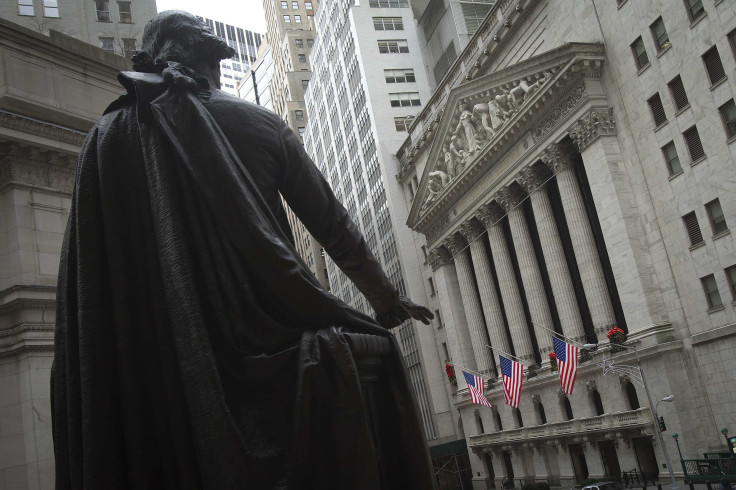Dow Jones Industrial Average Closes Below 18,000, Gold Prices Spike In Flight To Safety

U.S. stocks dropped Tuesday, with the Dow Jones Industrial Average closing below the 18,000 milestone as concerns about Greece's failure to elect a new president, coupled with declining oil prices, weighed on the global markets.
The Dow Jones Industrial Average, which measures the share prices of 30 large industrial companies, closed down 55.16 points, or 0.31 percent, to 17,983.07; the S&P 500 stock index lost 10.22 points, or 0.49 percent, to end at 2,080.35. The tech-heavy Nasdaq Composite declined 29.47 points, or 0.61 percent, to finish at 4,777.44.
The S&P 500 Index closed flat Tuesday after tallying its 53rd record close of 2014 during the previous session. Following last week’s record gains, with the Dow smashing the 18,000 milestone, the “Santa Claus Rally” is stuck in neutral heading into New Year's Eve. “With the recent rally that took us from scary levels back to record levels over the last three weeks, one really can't be too surprised. Can we get that end of year push into the New Year? I think that we can,” Stephen Guilfoyle, chief economist at Sarge986.com, said in a note to investors Tuesday.
Global stocks wavered Monday after members of the Greek parliament failed to elect a president for the third time, sending the stocks on the Athens Stock Exchange plunging more than 10 percent. The electoral failure forces Greece to hold a snap election on Jan. 25. After the vote, the Greek 10-year bond yield jumped more than 9 percent, as investors fled Greek bonds in favor of safe havens, including U.S. government securities. The capital flow also sent the U.S. 10-year Treasury yield down 2 basis points Tuesday to 2.19 percent. Bond prices move in the opposite direction of bond yields.
Meanwhile, gold prices rallied Tuesday as the flight to safety also sent gold futures for Feb. 15 delivery to as much as $1,210.90 an ounce, the highest intraday price since Dec. 18.
“The flight to safety today is less about energy and more about the uncertainty with Greece’s elections. But it’s a theme that keeps repeating itself. If there’s an economic or geopolitical event overseas, you typically see a flight to safety with investors buying the U.S. dollar and U.S. treasuries, and pushing the yield lower,” Jeff Kravetz, regional investment director at U.S. Bank Wealth Management, said.
Brent crude, the global benchmark for oil, fell to a 5-year low of less than $57 a barrel early Tuesday. That's its lowest level since May 15, 2009. But it recovered some losses and closed down 0.60 percent to $57.53 a barrel, for Feb. 15 delivery, on the London ICE Futures Exchange. West Texas Intermediate crude, the benchmark for U.S. oil prices, added 0.39 Tuesday to $53.82 per barrel, for Feb. 15 delivery, on the New York Mercantile Exchange.
Data Tuesday showed consumer confidence rebounded modestly in December, propelled by a considerably more favorable assessment of current economic and labor market conditions. Separate data showed U.S. single-family home prices slowed in October, following the stronger-than-expected rise seen in prices the previous month.
Economists are looking ahead to Wednesday, the last day of trading ahead of the New Year, as weekly jobless claims for the week ending Dec. 27 are released at 8:30 a.m. EST. Economists expect claims to rise 10,000 to 290,000 after totaling 280,000 the previous week, according to analysts polled by Thomson Reuters.
Also Wednesday, the Chicago Purchasing Managers Index, a closely watched survey that tracks regional manufacturing activity, is issued, along with the National Association of Realtors’ Pending Home Sales Index, a key leading indicator.
The U.S. stock market will be closed on Thursday for the New Year's holiday.
© Copyright IBTimes 2024. All rights reserved.












